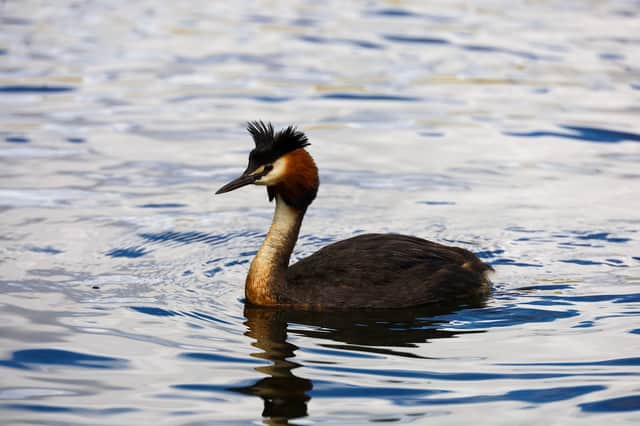What is Bird of the Century? John Oliver's pūteketeke wins NZ title with history of controversies


A puking water bird with influential celebrity supporters has won New Zealand's prestigious 'Bird of the Century' title - amid cries of fowl play over "American interference".
New Zealand holds a Bird of the Year competition each year to celebrate its vast array of native birds, who each get their own campaign managers and are voted on by members of the public. The event - arguably the most important on the country's political calendar - is almost always mired in controversy; from near-annual cheating scandals, to Antarctic birds that washed up in New Zealand invading the competition, to a native bat controversially taking the title in 2021.
Advertisement
Hide AdAdvertisement
Hide AdBut the stakes were upped in 2023, when Forest & Bird, the conservation charity that runs the election, announced this year's winner would be crowned 'Bird of the Century'. Comedian John Oliver stepped in as a campaign manager, leading to a record 350,000 verified votes from 195 countries - making 2023 the biggest year ever for the annual Bird of the Year competition. The influx of votes even saw the online platform crash, delaying the highly-anticipated results for two days.
On Wednesday (15 November), Forest & Bird revealed the pūteketeke - or Australasian crested grebe - had won, with 290,374 votes - with the second place winner scoring just under 13,000. "After a two-week battle of the birds that will go down in history, the pūteketeke now wears the coveted Bird of the Century crown atop its burnt-orange mullet," it said in a statement.
Forest & Bird chief executive Nicola Toki said: "Pūteketeke began as an outside contender for Bird of the Century but was catapulted to the top spot thanks to its unique looks, adorable parenting style, and propensity for puking... We’re not surprised these charming characteristics caught the eye of an influential bird enthusiast with a massive following.”
John Oliver 'causes a right flap'
British-American comedian John Oliver announced himself as the official campaign manager for the pūteketeke, using his HBO show and TV connections to launch a self-described “alarmingly aggressive” Bird of the Century campaign. He appeared on Jimmy Fallon's Tonight Show in a full, lifelike grebe costume, and funded billboards in Paris and Tokyo.
Advertisement
Hide AdAdvertisement
Hide AdIn response to the perceived “American interference” in the bird election, New Zealanders turned out at the polls in force, Forest & Bird said. Meanwhile, New Zealand media pulled out all the stops to drum up support for other species - while local campaign managers pivoted their efforts to riff off the unexpected development with flair.
“We promised controversy but didn’t quite expect this! We’re stoked to see the outpouring of passion, creativity and debate that this campaign has ignited,” Ms Toki said. “More than 80% of our native birds are on the threatened species list, yet clearly these amazing species mean so much to us as New Zealanders. Pending cuts to the Department of Conservation, the agency tasked with protecting these taonga [treasures] under threat, are a huge worry. The world is watching us and how we look after our birds.”
Past Bird of the Year controversies
The Bird of the Year competition began in 2005, and has been held annually ever since. It has attracted its fair share of controversies over the years, usually related to cheating or fraudulent votes, but it's typically a light-hearted event.
In 2015, two Auckland teenagers used their father's business account to create 200 fake email addresses, which all voted for the kōkako. Two years later, an IP address in Christchurch used internet bots to make 112 fraudulent votes for the white-faced heron.
Advertisement
Hide AdAdvertisement
Hide AdForest & Bird hired a data scientist in 2018 to prevent further scandals - but that same year someone in Australia managed to make hundreds of fraudulent votes for the black shag. The same thing happened in 2020, with the little spotted kiwi knocked from its top spot on the leaderboard after thousands of fake votes were discovered.
Other controversies have included emperor penguins being added to the ballot one year, after one of the Antarctic natives washed up in New Zealand and had to be rescued. The native long-tailed bat was added to the ballot in 2021, and managed to prevail despite controversy over it not being a bird. In 2022 the charismatic kākāpō was excluded from the competition because it had already won twice, much to the dismay of loyalists to the iconic ground-dwelling parrot.
What is a pūteketeke?
The pūteketeke is also known as the Australasian crested grebe. They are diving water birds, mainly found in New Zealand's alpine and subalpine lakes. The grebes are considered ‘Nationally Vulnerable’ in New Zealand, with fewer than 1,000 remaining. The species is also not faring well in Australia either, with a combined population across the two countries numbering less than 3,000.
But the situation was even more dire a few decades ago, Forest & Bird says, with the pūteketeke population dropping to a low of just 200 in the 1980s. Efforts such as the Lake Wānaka Grebe Project, which started with Forest & Bird member John Darby building a floating nest platform in 2013, have seen pūteketeke begin to recover.
Advertisement
Hide AdAdvertisement
Hide Ad"Pūteketeke deserve to be Bird of the Century in 2023 because their numbers have been slowly increasing, particularly in the upland Otago lakes,” says Petrina Duncan, the grebe co-ordinator for Forest & Bird’s Central Otago Lakes Branch. “It’s great to have a successful bird as an ambassador for all New Zealand birds to show that even threatened species can bounce back if we give them a hand.”
Comment Guidelines
National World encourages reader discussion on our stories. User feedback, insights and back-and-forth exchanges add a rich layer of context to reporting. Please review our Community Guidelines before commenting.
